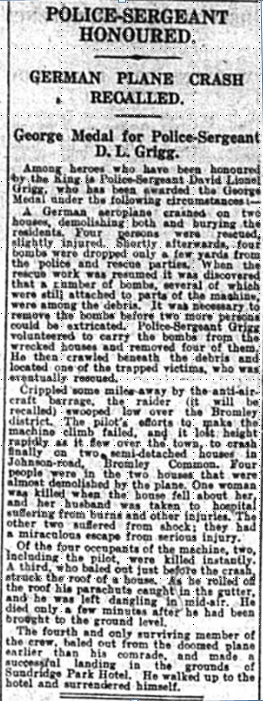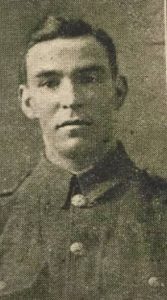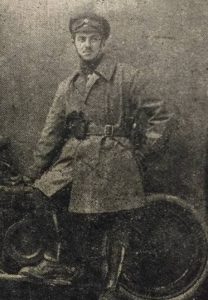On the evening of the 9th November 1940 at 19:00hrs the sirens began to ring out over Bromley due to enemy aircraft having been spotted flying towards the area. Half an hour later disaster stuck.
En route to Central London a Heinkel He 111 was hit by anti-aircraft fire. The damage was so severe that the bomber began to break up in the air, with one wing landing in the rear garden of 45 Cranmore Road in West Chislehurst.
With his plane out of control, the pilot bailed out, shortly followed by another crew member, moments before the plane crashed into two semi-detached houses on Johnson Road, Bromley Common. Rescue teams were quick on the scene, only to discover that between them, and the trapped victims of the house, were some 30 unexploded SC-50 bombs.
One of the first on the scene was Police Sergeant Grigg, a traffic patrol officer for the Metropolitan Police ‘P’ Division at Catford, who volunteered to carry away some of the bombs to help the rescue of the victims. Sergeant Grigg had no specialised knowledge of bombs and was aware that they might have exploded at any moment. In spite of this he went back and removed another bomb. The Deputy Assistant Commissioner in charge of the District stated in his report that whilst the Police Sergeant did not sustain personal injury by his action, he was in constant danger of the bombs exploding. “His coolness, courage, determination, and devotion to duty are worthy of recognition and I strongly recommend him for the grant of an award”.
He was recommended to be honoured for his bravery. The following report was published in the local newspaper following his award in March 1941.
Police-Sergeant Honoured
German Plane Crash Recalled
George Medal for Police-Sergeant D.L. Grigg
Among heroes who have been honoured by the King is Police-Sergeant David Lionel Grigg, who has been awarded the George Medal under the following circumstances: –
A German aeroplane crashed on two houses demolishing both and burying the residents. Four persons were rescued, slightly injured. Shortly afterwards, four bombs were dropped only a few yards from the police and rescue parties. When the rescue work resumed it was discovered that a number of bombs, several of which were still attached to parts of the machine, were among the debris. It was necessary to remove the bombs before two more persons could be extricated. Police-Sergeant Grigg volunteered to carry the bombs from the wrecked houses and removed four of them. He then crawled beneath the debris and located one of the trapped victims, who was eventually rescued.
Crippled some miles away by the anti-aircraft barrage, the raider (it will be recalled) swooped low over the Bromley district. The pilot’s efforts to make the machine climb failed, and it lost height rapidly on two semi-detached houses in Johnson Road, Bromley Common. Four people were in the two houses that were almost demolished by the plane. One woman was killed when he house fell about her, and her husband was taken to hospital suffering from burns and other injuries. The other two suffered from shock; they had a miraculous escape from serious injury.
Of the four occupants of the machine, two, including the pilot, were killed instantly. A third, who bailed out just before the crash struck the roof of a house. As he rolled off the roof his parachute caught in the gutter, and he was left dangling in mid-air. He died only a few minutes after he had been brought to the ground level.
The fourth and only surviving member of the crew, bailed out from the doomed plane earlier then his comrades, and made a successful landing in the grounds of Sundridge Park Hotel. He walked up to the hotel and surrendered himself.
Source:
Bromley & District Times, March 1941
Further information on event (Bromley Borough Local History Society)
“Heinkel He 111: The Early Years: Fall of France, Battle of Britain and the Blitz” By Chris Goss






